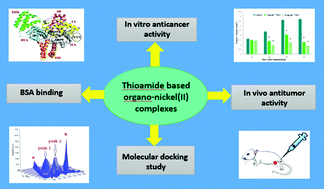In vitro and in vivo antiproliferative activity of organo-nickel SCS-pincer complexes on estrogen responsive MCF7 and MC4L2 breast cancer cells. Effects of amine fragment substitutions on BSA binding and cytotoxicity†
Abstract
A family of organonickel complexes has been prepared, fully characterized, and tested for their antiproliferative activity against estrogen-responsive human breast cancer cells (MCF7). The three SCS-type pincer ligands HL1, HL2, and HL3 and their corresponding Ni(II) complexes NiL1, NiL2, and NiL3 have been synthesized and fully characterized, including by single crystal diffraction studies for the complexes. The complexes possess square planar geometry with two symmetrical 5-membered nickellacycles. Fluorescence spectroscopy, circular dichroism measurements, molecular modeling, colorimetric based assay and tumor transplantation studies were used to evaluate the protein binding and antiproliferative activities of these organometallic complexes both in vitro and in vivo. Fluorescence quenching was used to investigate bovine serum albumin (BSA) interaction at different temperatures (293, 303 and 313 K), and the results were analyzed using the classical Stern–Volmer equation, allowing us to propose a dynamic quenching mechanism. Studies in vitro on the antiproliferative activity of the three organonickel complexes against estrogen-responsive human breast cancer cells (MCF7) showed promising antitumor activity for NiL1 containing pyrrolidine fragments. In vivo administration of this compound significantly inhibits tumor growth in estrogen-dependent MC4L2 cancer cells in female BALB/c mice.



 Please wait while we load your content...
Please wait while we load your content...